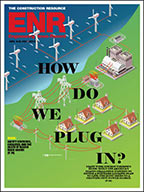The U.S. Dept. of Transportationsays that it is determined to crack down on the growing problem of disadvantaged business enterprise contracting abuse and that it will enforce a new zero-tolerance debarment policy.
This is one area where we have strengthened our efforts, Transportation Secretary Norman Y. Mineta told attendees at the transportation infrastructure fraud prevention conference, held April 25-27 in Orlando. About 300 auditors from federal and state DOT offices attended.
 |
| TODD ZINSER |
Officials said that DBE fraud seems to be on the rise. It accounted for 16.7% of open investigations in October 2001, but 22.4% four years later. The most common cases involve prime contractors that use firms with questionable DBE status to meet subcontracting goals or hire real DBEs that dont actually do the work.
One presenter discussed a case involving Houston-based Williams Brothers Construction, which settled a False Claims Act in December 2005 for using for using DBEs to meet contractual requirements that were found to have had ties to the prime contractor. The firm agreed to pay a $3-million fine and is on probation as a DOT contractor.
In another ongoing case, New York Citys Metropolitan Transit Authority found itself the victim of a New York contractor, EXCEL Group, that had four DBE subcontractors sign two contracts. One was for submission to MTA to meet a 20% DBE participation requirement. The other contract was for significantly smaller amounts, which the DBE firms were then told to execute. The case is still being prosecuted in federal court, but the Federal Transit Administration suspended EXCEL and its majority owner.
Todd Zinser, DOTs acting Inspector General, says the federal crackdown is not just to save taxpayer money, but to expose DBE abuses. The problem is that its going to hurt real DBEs and countermand the governments policy of helping them, he says. Weve shifted resources from a reactive role to strengthening measures to ensure that DBEs are properly certified.
DOT also hopes to use its new conractor suspension and debarment policy to deter companies from committing DBE and other types of fraud. Zinser says the agency tried to insert tougher suspension and debarment language into the recent highway bill but the Senate version excluded the measure.
Mineta opted to change the policy administratively. I receive updates from the IG when there are indictments or convictions for contract and grant fraud, he said. It concerned me when I would read about a company only to discover it was working on another project we were funding.;
The new policy is one of zero tolerance for those indicted or convicted of fraud. Zinser said the IGs office has five days to report an indictment or conviction to a federal agency. It then has 45 days to issue a suspension or debarment. If not, there must be a justification of why not, he added.
The effect will be to shift the debarment burden of proof from agencies to indicted companies.This will add some punch as a deterrent, Zinser said.

